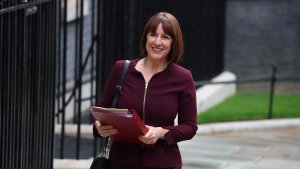UK Sees Record Monthly Budget Surplus, But Tough Picture Ahead Of Budget
Britain's public finances typically run a surplus in January, unlike other months.

Britain chalked up its highest ever monthly budget surplus in January due to record seasonal tax inflows, official figures showed on Wednesday, although the broader picture remains tough as finance minister Jeremy Hunt prepares his annual budget.
The Office for National Statistics said Britain ran a budget surplus of 16.7 billion pounds ($21.1 billion) in January, up from 7.5 billion pounds a year earlier although below economists' 18.7 billion pound forecast in a Reuters poll.
Britain's public finances typically run a surplus in January, unlike other months, as annual income tax payments are due that month.
Hunt will present his annual budget on March 6, and wants to cut taxes in order to boost the governing Conservative Party's popularity before the national election Prime Minister Rishi Sunak is expected to call later this year.
The Conservatives are heavily trailing the opposition Labour Party in opinion polls, and received a blow from official figures last week which showed the economy had fallen into a shallow recession in the second half of last year.
"January's public finances figures delivered some much-needed good news for the chancellor in the lead-up to the budget. But we doubt this will pave the way for a big pre-election splash," Ruth Gregory, deputy chief UK economist at Capital Economics, said.
Borrowing since the start of the tax year in April totalled 96.6 billion pounds, down from 99.7 billion pounds in the first 10 months of the 2022/23 tax year and the first such annual fall this financial year, helped by an upward revision to earlier tax receipts.
Central government revenue in January alone hit a monthly record of 111.4 billion pounds, up from 107.5 billion a year earlier.
However, net debt on the government's preferred measure, which excludes public sector banks and the Bank of England, was 2.418 trillion pounds or 88.1% of gross domestic product - down slightly from December but up from 85.0% of GDP a year ago.
MORE TAX CUTS?
Following Wednesday's borrowing data, Hunt's deputy, chief secretary to the Treasury Laura Trott, did not rule out further tax cuts in the budget, after reductions in November.
"While we will not speculate over whether further reductions in tax will be affordable in the budget, the economy is beginning to turn a corner," she said.
Lower inflation has eased the government's situation compared with a year ago, reducing debt interest payments - many of which are inflation linked - by 30% over the year to date to 68.9 billion pounds.
KPMG economist Michal Stelmach estimated that the government's fiscal headroom - the amount of extra spending or tax cuts possible while staying within its self-imposed budget rules - had risen to 21 billion pounds from 13 billion pounds at the time of a mid-year budget update in November.
This headroom is fairly low by historic standards and is based on budget plans for a squeeze on public spending after the next election, about which the government has not given details, at a time when many public services are stretched.
Despite the government cutting the rates of some taxes, Britain's overall tax burden has also been rising, largely because thresholds for paying income tax have not been increased in line with wage growth or inflation.
(Reporting by Suban Abdulla and David Milliken; editing by William James and Ros Russell)
Thanks for signing up to Minutehack alerts.
Brilliant editorials heading your way soon.
Okay, Thanks!

